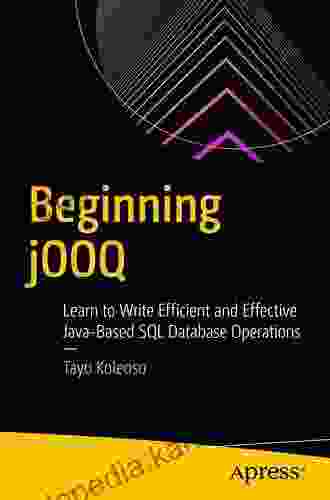Learn to Write Efficient and Effective Java-Based SQL Database Operations

Java is a powerful programming language that can be used to develop a wide variety of applications. One of the most common tasks that Java developers perform is interacting with databases. Java provides a number of libraries that make it easy to connect to databases, execute queries, and process results.
5 out of 5
| Language | : | English |
| File size | : | 10754 KB |
| Text-to-Speech | : | Enabled |
| Screen Reader | : | Supported |
| Enhanced typesetting | : | Enabled |
| Print length | : | 228 pages |
In this article, we will show you how to write efficient and effective Java-based SQL database operations. We will cover the following topics:
* Connecting to a database * Executing queries * Processing results * Using transactions * Using stored procedures
Connecting to a Database
The first step in interacting with a database is to connect to it. Java provides the DriverManager class for this purpose. The DriverManager class provides a number of static methods that can be used to connect to a database. The most common method is the getConnection() method.
The getConnection() method takes three parameters:
* The JDBC URL for the database * The username for the database * The password for the database
The JDBC URL is a string that specifies the location of the database. The username and password are used to authenticate the user to the database.
Here is an example of how to connect to a database:
java String url ="jdbc:mysql://localhost:3306/test";
String username ="root";
String password ="password";
Connection connection = DriverManager.getConnection(url, username, password);
Once you have a connection to the database, you can use it to execute queries and process results.
Executing Queries
Queries are used to retrieve data from a database. Java provides the Statement and PreparedStatement classes for this purpose. The Statement class is used to execute simple queries. The PreparedStatement class is used to execute parameterized queries.
Parameterized queries are more efficient than simple queries because they can be reused multiple times. When you execute a parameterized query, you specify the values for the parameters each time you execute the query. This allows the database to optimize the query execution plan.
Here is an example of how to execute a simple query:
java Statement statement = connection.createStatement();
ResultSet resultSet = statement.executeQuery("SELECT * FROM users");
while (resultSet.next()){int id = resultSet.getInt("id"); String name = resultSet.getString("name");
System.out.println(id + " " + name); }
Here is an example of how to execute a parameterized query:
java PreparedStatement preparedStatement = connection.prepareStatement("SELECT * FROM users WHERE id = ?");
preparedStatement.setInt(1, 1);
ResultSet resultSet = preparedStatement.executeQuery();
while (resultSet.next()){int id = resultSet.getInt("id"); String name = resultSet.getString("name");
System.out.println(id + " " + name); }
Processing Results
The ResultSet class represents the results of a query. The ResultSet class provides a number of methods that can be used to navigate through the results and retrieve the values for the columns.
The most common methods used to navigate through the results are the next() and previous() methods. The next() method moves the cursor to the next row in the results. The previous() method moves the cursor to the previous row in the results.
The most common methods used to retrieve the values for the columns are the getInt(), getString(), and getDouble() methods. The getInt() method retrieves the value for the column as an integer. The getString() method retrieves the value for the column as a string. The getDouble() method retrieves the value for the column as a double.
Here is an example of how to process the results of a query:
java ResultSet resultSet = statement.executeQuery("SELECT * FROM users");
while (resultSet.next()){int id = resultSet.getInt("id"); String name = resultSet.getString("name");
System.out.println(id + " " + name); }
Using Transactions
Transactions are used to group a series of database operations together. Transactions ensure that either all of the operations in the transaction are committed to the database, or none of the operations are committed to the database. This can be useful for ensuring that the database remains in a consistent state.
Java provides the Transaction class for this purpose. The Transaction class provides a number of methods that can be used to start, commit, and rollback transactions.
Here is an example of how to use transactions:
java Transaction transaction = connection.beginTransaction();
try { transaction.commit(); }catch (SQLException e){transaction.rollback(); }
Using Stored Procedures
Stored procedures are pre-compiled SQL statements that can be stored in the database. Stored procedures can be used to perform complex operations on the database. Stored procedures can be called from Java using the CallableStatement class.
The CallableStatement class provides a number of methods that can be used to set the parameters for the stored procedure and to execute the stored procedure.
Here is an example of how to call a stored procedure:
java CallableStatement callableStatement = connection.prepareCall("{call get_user_info(?)}");
callableStatement.setInt(1, 1);
callableStatement.execute();
ResultSet resultSet = callableStatement.getResultSet();
while (resultSet.next()){int id = resultSet.getInt("id"); String name = resultSet.getString("name");
System.out.println(id + " " + name); }
In this article, we have shown you how to write efficient and effective Java-based SQL database operations. We have covered the following topics:
* Connecting to a database * Executing queries * Processing results * Using transactions * Using stored procedures
By following the tips and techniques in this article, you can write Java-based SQL database operations that are both efficient and effective.
5 out of 5
| Language | : | English |
| File size | : | 10754 KB |
| Text-to-Speech | : | Enabled |
| Screen Reader | : | Supported |
| Enhanced typesetting | : | Enabled |
| Print length | : | 228 pages |
Do you want to contribute by writing guest posts on this blog?
Please contact us and send us a resume of previous articles that you have written.
 Book
Book Novel
Novel Page
Page Chapter
Chapter Text
Text Story
Story Genre
Genre Reader
Reader Library
Library Paperback
Paperback E-book
E-book Magazine
Magazine Newspaper
Newspaper Paragraph
Paragraph Sentence
Sentence Bookmark
Bookmark Shelf
Shelf Glossary
Glossary Bibliography
Bibliography Foreword
Foreword Preface
Preface Synopsis
Synopsis Annotation
Annotation Footnote
Footnote Manuscript
Manuscript Scroll
Scroll Codex
Codex Tome
Tome Bestseller
Bestseller Classics
Classics Library card
Library card Narrative
Narrative Biography
Biography Autobiography
Autobiography Memoir
Memoir Reference
Reference Encyclopedia
Encyclopedia A G Ravan Farhadi
A G Ravan Farhadi Charles Gilman
Charles Gilman Alaa Suleiman
Alaa Suleiman Adam A Graham
Adam A Graham Abul Hasan Ali Nadwi
Abul Hasan Ali Nadwi Aatif M Husain
Aatif M Husain Addie Gundry
Addie Gundry Alejandra Gonzalez
Alejandra Gonzalez Alan Lynn
Alan Lynn Adam O Grady
Adam O Grady Adam A J Deville
Adam A J Deville Adam Burke
Adam Burke Aileen Terry
Aileen Terry Alden Marshall
Alden Marshall Adrian Michel
Adrian Michel Albert S Kaplan
Albert S Kaplan Alan Hlad
Alan Hlad A C Miller
A C Miller Adam Leith Gollner
Adam Leith Gollner Aj Dora
Aj Dora
Light bulbAdvertise smarter! Our strategic ad space ensures maximum exposure. Reserve your spot today!

 Jake PowellTransform Your Body, Transform Your Life: A Comprehensive Guide to Holistic...
Jake PowellTransform Your Body, Transform Your Life: A Comprehensive Guide to Holistic...
 Graham BlairThe Correct Translation of the Noble Qur'an in English: Exploring the Entire...
Graham BlairThe Correct Translation of the Noble Qur'an in English: Exploring the Entire... Frank MitchellFollow ·19.1k
Frank MitchellFollow ·19.1k Edgar HayesFollow ·15.7k
Edgar HayesFollow ·15.7k Eliot FosterFollow ·19.1k
Eliot FosterFollow ·19.1k Francis TurnerFollow ·13.2k
Francis TurnerFollow ·13.2k Miguel NelsonFollow ·7.8k
Miguel NelsonFollow ·7.8k Geoffrey BlairFollow ·11.2k
Geoffrey BlairFollow ·11.2k Rick NelsonFollow ·2.5k
Rick NelsonFollow ·2.5k Efrain PowellFollow ·17.9k
Efrain PowellFollow ·17.9k

 Darren Nelson
Darren NelsonJourney into the Culinary Delights of "Eat Cook": An...
: Unlocking the Secrets of Streamlined...

 Brett Simmons
Brett SimmonsEmbark on a Culinary Journey: Traditional Soviet Union...
Nestled on the...

 Ben Hayes
Ben HayesBest Hummus Recipes From All Over the World
A Culinary Journey Into the...

 Truman Capote
Truman CapoteDelicious Macarons Recipes From The Heart: 10 Desserts...
Step into the enchanting realm...

 Isaias Blair
Isaias BlairNurturing Young Hearts: Exploring Empathy, Kindness, and...
: The Importance...

 Dan Bell
Dan BellChildren Picture About Friendship For Preschool Emotions...
This book is a great way to...
5 out of 5
| Language | : | English |
| File size | : | 10754 KB |
| Text-to-Speech | : | Enabled |
| Screen Reader | : | Supported |
| Enhanced typesetting | : | Enabled |
| Print length | : | 228 pages |








